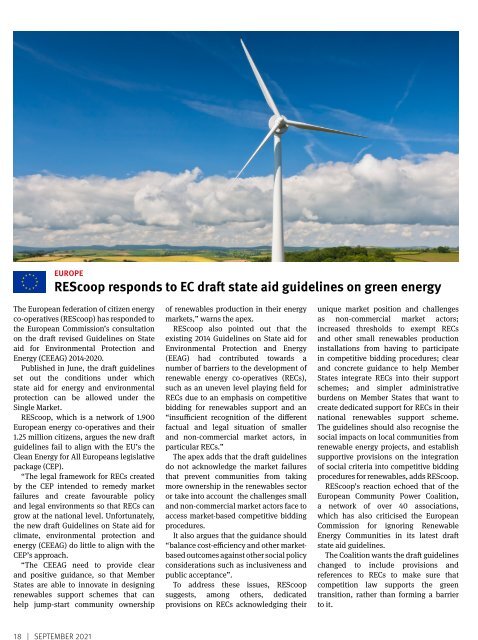Co-op News September 2021
The September edition of Co-op News: connecting, challenging and championing the global co-operative movement. This issue we look at Principle 6 - co-operation among co-ops: including a look at how co-ops are coming together to find solutions to the environmental challenges facing the world - whether that means stepping up the war on plastic waste in the UK or helping the clean energy transition in Croatia. We look at efforts to provide co-op housing and community pubs, and speak to Lord Victor Adebowale – Co-op Group director and chair of Social Enterprise UK - about co-operation with other socially led sectors. And there's a look at the co-op environment that helped nurture US Olympian Dalilah Muhammad.
The September edition of Co-op News: connecting, challenging and championing the global co-operative movement. This issue we look at Principle 6 - co-operation among co-ops: including a look at how co-ops are coming together to find solutions to the environmental challenges facing the world - whether that means stepping up the war on plastic waste in the UK or helping the clean energy transition in Croatia. We look at efforts to provide co-op housing and community pubs, and speak to Lord Victor Adebowale – Co-op Group director and chair of Social Enterprise UK - about co-operation with other socially led sectors. And there's a look at the co-op environment that helped nurture US Olympian Dalilah Muhammad.
You also want an ePaper? Increase the reach of your titles
YUMPU automatically turns print PDFs into web optimized ePapers that Google loves.
18 | SEPTEMBER <strong>2021</strong><br />
EUROPE<br />
RESco<strong>op</strong> responds to EC draft state aid guidelines on green energy<br />
The Eur<strong>op</strong>ean federation of citizen energy<br />
co-<strong>op</strong>eratives (RESco<strong>op</strong>) has responded to<br />
the Eur<strong>op</strong>ean <strong>Co</strong>mmission’s consultation<br />
on the draft revised Guidelines on State<br />
aid for Environmental Protection and<br />
Energy (CEEAG) 2014-2020.<br />
Published in June, the draft guidelines<br />
set out the conditions under which<br />
state aid for energy and environmental<br />
protection can be allowed under the<br />
Single Market.<br />
RESco<strong>op</strong>, which is a network of 1.900<br />
Eur<strong>op</strong>ean energy co-<strong>op</strong>eratives and their<br />
1.25 million citizens, argues the new draft<br />
guidelines fail to align with the EU’s the<br />
Clean Energy for All Eur<strong>op</strong>eans legislative<br />
package (CEP).<br />
“The legal framework for RECs created<br />
by the CEP intended to remedy market<br />
failures and create favourable policy<br />
and legal environments so that RECs can<br />
grow at the national level. Unfortunately,<br />
the new draft Guidelines on State aid for<br />
climate, environmental protection and<br />
energy (CEEAG) do little to align with the<br />
CEP’s approach.<br />
“The CEEAG need to provide clear<br />
and positive guidance, so that Member<br />
States are able to innovate in designing<br />
renewables support schemes that can<br />
help jump-start community ownership<br />
of renewables production in their energy<br />
markets,” warns the apex.<br />
RESco<strong>op</strong> also pointed out that the<br />
existing 2014 Guidelines on State aid for<br />
Environmental Protection and Energy<br />
(EEAG) had contributed towards a<br />
number of barriers to the devel<strong>op</strong>ment of<br />
renewable energy co-<strong>op</strong>eratives (RECs),<br />
such as an uneven level playing field for<br />
RECs due to an emphasis on competitive<br />
bidding for renewables support and an<br />
“insufficient recognition of the different<br />
factual and legal situation of smaller<br />
and non-commercial market actors, in<br />
particular RECs.”<br />
The apex adds that the draft guidelines<br />
do not acknowledge the market failures<br />
that prevent communities from taking<br />
more ownership in the renewables sector<br />
or take into account the challenges small<br />
and non-commercial market actors face to<br />
access market-based competitive bidding<br />
procedures.<br />
It also argues that the guidance should<br />
“balance cost-efficiency and other marketbased<br />
outcomes against other social policy<br />
considerations such as inclusiveness and<br />
public acceptance”.<br />
To address these issues, RESco<strong>op</strong><br />
suggests, among others, dedicated<br />
provisions on RECs acknowledging their<br />
unique market position and challenges<br />
as non-commercial market actors;<br />
increased thresholds to exempt RECs<br />
and other small renewables production<br />
installations from having to participate<br />
in competitive bidding procedures; clear<br />
and concrete guidance to help Member<br />
States integrate RECs into their support<br />
schemes; and simpler administrative<br />
burdens on Member States that want to<br />
create dedicated support for RECs in their<br />
national renewables support scheme.<br />
The guidelines should also recognise the<br />
social impacts on local communities from<br />
renewable energy projects, and establish<br />
supportive provisions on the integration<br />
of social criteria into competitive bidding<br />
procedures for renewables, adds RESco<strong>op</strong>.<br />
RESco<strong>op</strong>’s reaction echoed that of the<br />
Eur<strong>op</strong>ean <strong>Co</strong>mmunity Power <strong>Co</strong>alition,<br />
a network of over 40 associations,<br />
which has also criticised the Eur<strong>op</strong>ean<br />
<strong>Co</strong>mmission for ignoring Renewable<br />
Energy <strong>Co</strong>mmunities in its latest draft<br />
state aid guidelines.<br />
The <strong>Co</strong>alition wants the draft guidelines<br />
changed to include provisions and<br />
references to RECs to make sure that<br />
competition law supports the green<br />
transition, rather than forming a barrier<br />
to it.


















